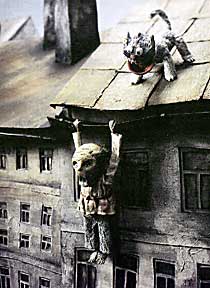Decades ago, just about any film you might
see at your local movie house was part of a double bill – two
feature films for the price of one. And, of course, there was
the newsreel to start everything off. There was also a time when,
just before the feature began, you could witness a brief entertainment
known as the short film.
This phenomenon occurred not so long ago – I remember shorts
at the movies – but then I’m not as young as I used to be. The
economics (mostly) of the film industry today have made this
pleasurable entertainment all but extinct at commercial cinemas,
and the public is really missing out. Good short films are like
good short stories – concise, to the point and, when they’re
really on target – they can move us.
These days we have to make do with the few local film festivals
that play short films before features or search out those rare
programs of short films, such as "The World According to
Shorts" screening at the Brooklyn Academy of Music’s Rose
Cinemas on Aug. 1 and Aug. 2. These films have been culled from
the "Festival du Court Metrage" in the French town
of Clermont-Ferrand, one of a number of European festivals that
devote themselves solely to this kind of work.
There are many different kinds of short filmmakers. Most film
students use short films as their means of fulfilling academic
requirements. (Perhaps only the wealthiest of film majors could
underwrite their own feature-length student film.) Young professionals
use short films as "calling cards" – to show the executives
in the industry what they’re capable of. Many a deal has been
struck between studios and short filmmakers. In addition, many
experimental and avant-garde works are less than feature-length.
(I consider feature-length to be 60 minutes or more.)
While festivals like Clermont-Ferrand’s screen more than 400
films for the public, BAMcinematek will present a much more manageable
series of 10 films, ranging in length from four to 27 minutes,
in two programs.
The five films in Program I (Aug. 1 at 6:50 pm; Aug. 2 at 9:10
pm) include the animated films "The Fall" and "Ring
of Fire." "The Fall" has all the earmarks of classic
Czech animation. (The film is from FAMU, the famed Prague film
school.) Made in 1999, it harks back to the days of the Iron
Curtain.
The setting is a bleak city street – a long line of identical
women wait outside a store for their chance to buy merchandise.
As they wait, a man hangs from the top of a building. He resembles
Lenin, and this is no accident – just before he slips from the
roof, an archival image of the Communist leader appears – leaving
no doubt as to what this 14-minute stop-motion animation represents.
The dark imagery is richly textured, and allows us to supply
our own political interpretations. This style of political allegory
has been seen over and over in Eastern European animation, but
if you’ve never experienced it, it’s worth a look.
"Ring of Fire," a 15-minute (2000) animated film from
Germany, has a style that is reminiscent of several things. First
and foremost, it appears to be a Western, complete with a cowboy-drawled
narrator. The narration may seem other-worldly, but at times
the animation gives a literal interpretation to the words (for
example, the narrator speaks of waiting for the spirits, while
the two animated cowboys – the main characters – appear to finish
off a bottle of booze).
But the real thrust of this work is most likely their erotic
adventures – or fantasies. And while the two cowboys remind me
of the Spy vs. Spy cartoons from Mad magazine, an outrageous
erotic siren and the rest of the hyper-sexualized figures combine
both cubism and naif drawings. It all makes for fabulous black-and-white
imagery, which can be appreciated on its own, but the cowboy
motif doesn’t make a great deal of sense.
Program II (Aug. 1 at 9:10 pm; Aug. 2 at 6:50pm) highlights some
live-action films, among them "The Red BMW," a half-hour
film from Brazil. Odilon lives in poverty with his wife and four
children. He finally gets lucky – he’s just won a brand new car.
Too bad he can’t afford the fees or insurance, and doesn’t know
how to drive. To make matters worse, the rules of the contest
that gave him the car keep him from selling it for two years.
So it becomes, not only the hit of the neighborhood, but a sort
of second home as well. With a wry sense of humor, it gives a
realistic but not too heavy-handed view of the realities of poverty
in Brazil’s cities.
Another witty film in this program is a comedy from Finland,
"A Stone Left Unturned." A father and son try to hunt
together, fish together and work the land together, without much
success. Each incident is shot as a visual one-liner.
"To Be Continued," also in Program II, presents an
assortment of suspenseful moments: while two men carry on a conversation
on the street, one’s child breaks away to chase her runaway doll
carriage. A couple in a kitchen wait for an egg to boil, and
if looks could kill Meanwhile, a young couple appears to be having
an affair; intercut with their torrid scene, a man slowly climbs
the stairs of an apartment building. The deft editing leads us
to believe we know how it will all end, but this prize-winning
film (best short in the Critics’ Week section at last year’s
Cannes Film Festival) leaves us guessing beyond the end of this
tense and tricky film.
There are more prize-winning films in the programs ("Summertime"
in Program I was an award-winner at Clermont-Ferrand; "A
Stone Left Unturned" was nominated for best short film by
the European Film Academy), and most of these films have made
appearances at other European film festivals (Program I’s "A
Heap of Trouble" was also shown at Cannes this year), which
speaks to the importance with which other countries view these
short gems. Let’s be grateful for the opportunity to catch some
of these international shorts in Brooklyn.
Marian Masone is the associate
director of programming for the Film Society of Lincoln Center
and chief curator of The New York Video Festival also at Lincoln
Center.
"The World According to Shorts"
will take place Aug. 1 and Aug. 2 at the BAM Rose Cinemas [30
Lafayette Ave., (718) 636-4100 or www.bam.org]. Program 1 at
6:50 pm on Aug. 1 and 9:10 pm on Aug. 2. Program 2 at 9:10 pm
on Aug. 1 and 6:50 pm on Aug. 2. Tickets are $9, $6 students.

























